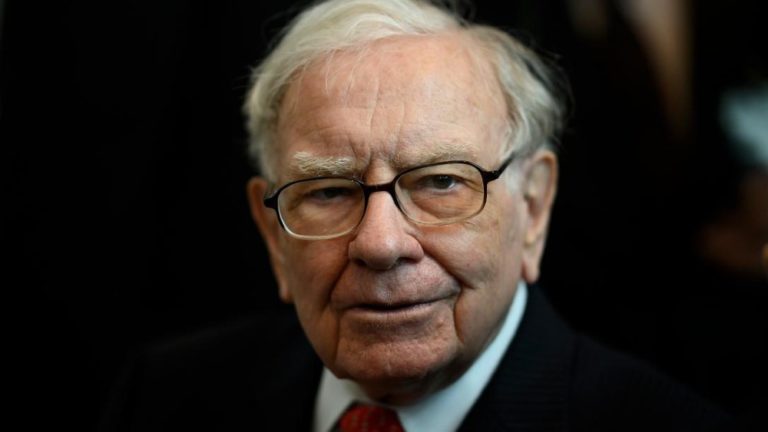One of the greatest signs of intelligence is the ability to explain complex topics in a plain and simple manner that people can understand. This is what makes Warren Buffett such a genius. That’s not to say that he isn’t ridiculously book smart either.
In his biography, Snowball, author Alice Schroeder details stories about Buffett in college on how he would read all of his books during the first week of class. He would basically memorize everything in the book so he could focus on other parts of his life that made him happy.
It’s also been said that Buffett’s brain is pretty much a present value calculator so he’s able to quickly take company cash flows and discount rates and come up with a back-of-the-envelope company valuation on the spot. Buffett’s intellectual gifts have helped him grow his wealth, but his emotional intelligence and ability to think independently are what really sets him apart.
He even admits this himself: “Success in investing doesn’t correlate with IQ once you’re above the level of 100. Once you have ordinary intelligence, what you need is the temperament to control the urges that get other people into trouble in investing.”
Everything written by or about Buffett is welcomed as many find his advice useful. His shareholder letters are no exception. Buffett devotes a section of each annual letter to instilling lessons of his investment wisdom.
He talked about his writing approach in a recent talk with some MBA students: “I also like to write one section that is a general teaching lesson that doesn’t directly apply to Berkshire. These are thoughts about investing. I’m talking to all people thinking about investing and how they should go about it.”
Most of Berkshire Hathaway’s annual letters from the past decade along with bits and pieces from older editions have appeared in books and elsewhere. These letters should probably be required reading for every MBA program or future business leader because of the transparency, depth of information, and common sense management/leadership lessons. The most popular letter was the 1987 edition. What follows are some of the parts of Buffett’s 1987 shareholder letter.
On keeping the focus on the business:
When investing, we view ourselves as business analysts – not as market analysts, not as macroeconomic analysts, and not even as security analysts.
The classic tale of Mr. Market:
Ben Graham, my friend, and teacher, long ago described the mental attitude toward market fluctuations that I believe to be most conducive to investment success. He said that you should imagine market quotations as coming from a remarkably accommodating fellow named Mr. Market who is your partner in a private business. Without fail, Mr. Market appears daily and names a price at which he will either buy your interest or sell you his. Even though the business that the two of you own may have economic characteristics that are stable, Mr. Market’s quotations will be anything but. For, sad to say, the poor fellow has incurable emotional problems. At times he feels euphoric and can see only the favorable factors affecting the business. When in that mood, he names a very high buy-sell price because he fears that you will snap up his interest and rob him of imminent gains. At other times he is depressed and can see nothing but trouble ahead for both the business and the world. On these occasions, he will name a very low price since he is terrified that you will unload your interest in him.
Mr. Market has another endearing characteristic: He doesn’t mind being ignored. If his quotation is uninteresting to you today, he will be back with a new one tomorrow. Transactions are strictly at your option. Under these conditions, the more manic-depressive his behavior, the better for you. But, like Cinderella at the ball, you must heed one warning or everything will turn into pumpkins and mice: Mr. Market is there to serve you, not to guide you. It is his pocketbook, not his wisdom, that you will find useful. If he shows up someday in a particularly foolish mood, you are free to either ignore him or to take advantage of him, but it will be disastrous if you fall under his influence. Indeed, if you aren’t certain that you understand and can value your business far better than Mr. Market, you don’t belong in the game. As they say in poker, “If you’ve been in the game 30 minutes and you don’t know who the patsy is, you’re the patsy.
Ben’s Mr. Market allegory may seem out-of-date in today’s investment world, in which most professionals and academicians talk of efficient markets, dynamic hedging, and betas. Their interest in such matters is understandable since techniques shrouded in mystery clearly have value to the purveyor of investment advice. After all, what witch doctor has ever achieved fame and fortune by simply advising “Take two aspirins”? The value of market esoterica to the consumer of investment advice is a different story. In my opinion, investment success will not be produced by arcane formulae, computer programs or signals flashed by the price behavior of stocks and markets. Rather an investor will succeed by coupling good business judgment with an ability to insulate his thoughts and behavior from the super-contagious emotions that swirl about the marketplace. In my own efforts to stay insulated, I have found it highly useful to keep Ben’s Mr. Market concept firmly in mind.
On Investment Activity and the Value of Long-Term Thinking:
Severe change and exceptional returns usually don’t mix. Most investors, of course, behave as if just the opposite were true. That is, they usually confer the highest price-earnings ratios on exotic-sounding businesses that hold out the promise of feverish change. That prospect lets investors fantasize about future profitability rather than face today’s business realities. For such investor-dreamers, any blind date is preferable to one with the girl next door, no matter how desirable she may be. Experience, however, indicates that the best business returns are usually achieved by companies that are doing something quite similar today to what they were doing five or ten years ago.
Certainly, in the transaction-fixated Wall Street of recent years, our posture must seem odd: To many in that arena, both companies and stocks are seen only as raw material for trades.
We have “professional” investors, those who manage many billions, to thank for most of this turmoil. Instead of focusing on what businesses will do in the years ahead, many prestigious money managers now focus on what they expect other money managers to do in the days ahead. For them, stocks are merely tokens in a game, like a thimble and flatiron in Monopoly.
If you’ve thought that investment advisors were hired to invest, you may be bewildered by this technique. After buying a farm, would a rational owner next order his real estate agent to start selling off pieces of it whenever a neighboring property was sold at a lower price? Or would you sell your house to whatever bidder was available at 9:31 on some morning merely because at 9:30 a similar house sold for less than it would have brought on the previous day?
Many commentators, however, have drawn an incorrect conclusion upon observing recent events: They are fond of saying that the small investor has no chance in a market now dominated by the erratic behavior of the big boys. This conclusion is dead wrong: Such markets are ideal for any investor – large or small – so long as he sticks to his investment knitting.
Volatility caused by money managers who speculate irrationally with huge sums will offer the true investor more chances to make intelligent investment moves. He can be hurt by such volatility only if he is forced, by either financial or psychological pressures, to sell at untoward times.
(Based on a Post by Ben Carlson)




















